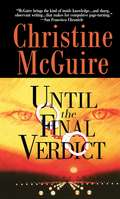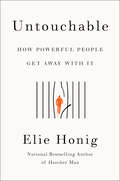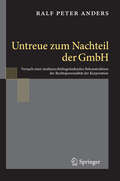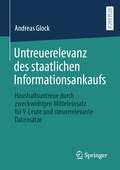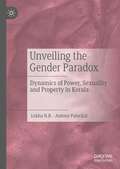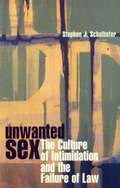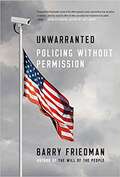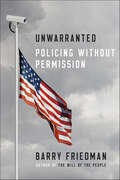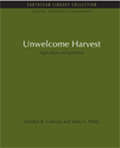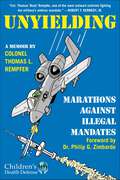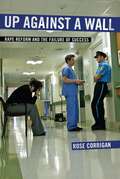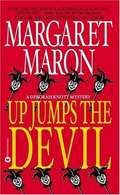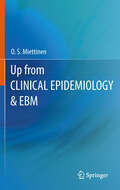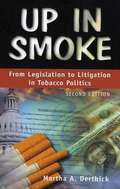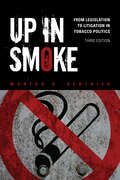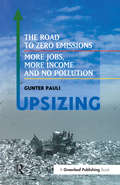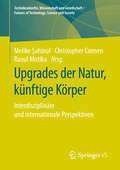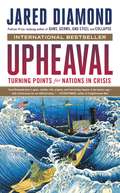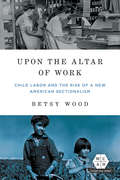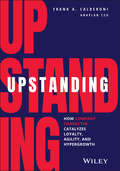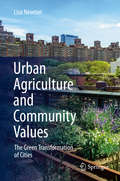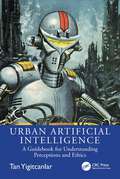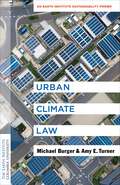- Table View
- List View
Until the Final Verdict
by Christine McguireDistrict Attorney Kathryn Mackay finds herself the prime murder suspect in this mesmerizing thriller by New York Times bestselling author and real-life prosecutor Christine McGuire. Judge Jemima Tucker has been brutally murdered in her chambers at the Santa Rita County courthouse -- and Kathryn Mackay vows to bring her friend's killer to justice. But when both Tucker's husband and another judge become suspects, Kathryn ends up walking a minefield of deadly accusations. Meanwhile, Kathryn and her newly reconciled lover, Sheriff Dave Granz, bring an old enemy, Robert Simmons, back into custody. But when Simmons dies unexpectedly under Kathryn's sole supervision -- and the cause of death is found to be homicide -- Kathryn finds herself fighting for her job, her family, and her life. A shocking novel of murder and betrayal, Until the Final Verdict is suspense at its finest.
Unto This Last and Other Writings
by John RuskinFirst and foremost an outcry against injustice and inhumanity, Unto this Last is also a closely argued assault on the science of political economy, which dominated the Victorian period. Ruskin was a profoundly conservative man who looked back to the Middle Ages as a Utopia, yet his ideas had a considerable influence on the British socialist movement. And in making his powerful moral and aesthetic case against the dangers of unhindered industrialization he was strangely prophetic. This volume shows the astounding range and depth of Ruskin's work, and in an illuminating introduction the editor reveals the consistency of Ruskin's philosophy and his adamant belief that questions of economics, art and science could not be separated from questions of morality. In Ruskin's words, 'There is no Wealth but Life.'
Untouchable: How Powerful People Get Away with It
by Elie HonigA NEXT BIG IDEA CLUB 'MUST-READ'CNN senior legal analyst and nationally bestselling author Elie Honig explores America’s two-tier justice system, explaining how the rich, the famous, and the powerful— including, most notoriously, Donald Trump—manipulate the legal system to escape justice and get away with vast misdeeds.How does he get away with it? That question, more than any other, vexes observers of and participants in the American criminal justice process. How do powerful people weaponize their wealth, political power, and fame to beat the system? And how can prosecutors fight back?In Untouchable, Elie Honig exposes how the rich and powerful use the system to their own benefit, revealing how notorious figures like Donald Trump, Jeffrey Epstein, Harvey Weinstein, and Bill Cosby successfully eluded justice for decades. He demonstrates how the Trump children dodged a fraud indictment. He makes clear how countless CEOs and titans of Wall Street have been let off the hook, receiving financial penalties without suffering criminal consequences. This doesn’t happen by accident.Over the four years of his administration, Donald Trump’s corruption seemed plain for all to see. The former president obstructed justice, flouted his responsibility to the Constitution, lied to the American people, and set the United States on a dark path to disunity and violence. Yet he has never been held accountable for any of his misdeeds. Why not?Untouchable holds the answer. Honig shows how Trump and others use seemingly fair institutions and practices to build empires of corruption and get away with misdeeds for which ordinary people would be sentenced to years behind bars. It’s not just that money talks, Honig makes clear, but how it can corrupt otherwise reliable institutions and blind people to the real power dynamics behind the scenes.In this vital, incisive book, Honig explains how the system allows the powerful to become untouchable, takes us inside their heads, and offers solutions for making the system more honest and fairer, ensuring true justice for all—holding everyone, no matter their status, accountable for their criminal misdeeds.
Untreue zum Nachteil der GmbH: Versuch einer strafunrechtsbegründenden Rekonstruktion der Rechtspersonalität der Korporation
by Ralf Peter AndersDie Arbeit untersucht Grund und Grenzen der Dispositionsbefugnis der Gesellschafter über das GmbH-Vermögen im Rahmen der sog. Organuntreue. Der normative Zusammenhang zwischen der juristischen Person und ihren natürlichen "Hinterleuten" wird in einem neuartigen und grundlegenden Zugang in seinem spezifisch gesellschaftsrechtlichen Kontext in Beziehung zu rechtsphilosophischen Begründungszusammenhängen gesetzt, indem in Abgrenzung zu insbesondere systemtheoretischen und ökonomischen Ansätzen die Grundbegriffe Person, Institution und Korporation unabhängig von kontingenten funktionalistischen und wirtschaftlich-utilitaristischen Erwägungen über ein freiheitlich-intersubjektives Anerkennungsverhältnis bestimmt werden. Die Grenze einer Dispositionsbefugnis der GmbH-Gesellschafter wird dabei über eine unternehmensbezogene teilhabegerechtigkeitstheoretische Aktualisierung der Kantischen Privatrechtslehre entwickelt.
Untreuerelevanz des staatlichen Informationsankaufs: Haushaltsuntreue durch zweckwidrigen Mitteleinsatz für V-Leute und steuerrelevante Datensätze
by Andreas GlockDer Autor widmet sich der Haushaltsuntreue gem. § 266 StGB im Zuge des staatlichen Ankaufs von Informationen. Nach einem phänomenologischen Einstieg erarbeitet er die Kriterien für die Annahme einer untreuespezifischen Pflichtverletzung. Hierfür setzt er sich mit den Ermächtigungsgrundlagen für den V-Leute-Einsatz und den Ankauf von Steuer-CDs/Steuerdatensätzen auseinander. Im Weiteren werden in Bezug auf den Vermögensnachteil mögliche Kompensationsansätze und das Kriterium der materiellen Zweckwidrigkeit vorgestellt, welche auf die Haushaltsuntreue angewandt werden. Dabei wird insbesondere ausgeführt, inwieweit die Verfälschung des Staatswillens, mögliche Beweisverwertungsverbote und die Grundsätze der Wirtschaftlichkeit und Sparsamkeit Berücksichtigung finden können. In einem abschließenden Teil bezieht der Autor Stellung, inwieweit eine Untreuestrafbarkeit auch aus dem Unterlassen von staatlichen Informationsankäufen resultieren kann.
Unveiling the Gender Paradox: Dynamics of Power, Sexuality and Property in Kerala
by Lekha N.B. Antony PalackalBoth nationally and internationally, the south Indian state of Kerala has been an object of study for its matrilineal kinship organization among some communities, as well as its achievements in education, literacy, and life expectancy for women against a weak economic base. Nonetheless, scholars have drawn attention to a paradox in Kerala’s model of development, namely women’s deteriorating social position in Kerala and the rise in violence against women. Against this backdrop, this book explores the intersections of gender, sexuality, marriage, family and kinship as related to the matrilineal Nayar community in Kerala. Chapters unravel the interplay between the triple categories of gender, power and social development as they play out at the micro, meso, and macro levels of society, probing the ways in which Nayar women practice agency. Ultimately, the authors explore how the strength of the Nayar community can be used as a case study toward circumventing the prevailing gender paradox and re-imagine a more liberated, empowered and self-reliant woman not only in Kerala, but in India at large. This book will be of interest to scholars in sociology, gender studies, and development studies, particularly those with a focus on South Asia.
Unwanted Sex: The Culture Of Intimidation And The Failure Of Law
by Stephen J. SchulhoferDespite three decades of intense scrutiny and repeated attempts at ambitious reform, our laws against rape and sexual harassment still fail to protect women from sexual overreaching and abuse. What went wrong? In this original, provocative, and enlightening work, Stephen Schulhofer, a distinguished scholar in criminal law, shows the need to refocus our laws against rape and to create a new system of legal safeguards against interference with sexual autonomy. Our laws provide comprehensive protection for property rights, labor, and other important interests, but sexual autonomy--the right to choose freely whether and when to be sexually intimate with another person--is devalued and ignored. With vivid examples, including stranger assaults, date rapes, and sexual encounters between job supervisors and subordinates, teachers and students, doctors and patients, lawyers and clients, Schulhofer shows that recent reforms of rape and sexual harassment law are overrated and inadequate. From the excessive degree of force necessary for an aggressive action to be defined as rape, to the gray areas in which coercion and exploitation can be used to elicit a false but legally valid "consent," Schulhofer offers a clear analysis of the limits of current standards. His proposals for a radically different approach hold the promise of genuine respect and effective protection for the sexual autonomy of both women and men. It is an ambitious yet sensible vision, committed to allowing willing partners to seek consensual relationships, while fully protecting each person's right to refuse sexual encounters that are not genuinely desired.
Unwarranted: Policing Without Permission
by Barry Friedman“At a time when policing in America is at a crossroads, Barry Friedman provides much-needed insight, analysis, and direction in his thoughtful new book. Unwarranted illuminates many of the often ignored issues surrounding how we police in America and highlights why reform is so urgently needed. This revealing book comes at a critically important time and has much to offer all who care about fair treatment and public safety.” ―Bryan Stevenson, founder and Executive Director of the Equal Justice Initiative and author of Just Mercy: A Story of Justice and Redemption <p><p> In June 2013, documents leaked by Edward Snowden sparked widespread debate about secret government surveillance of Americans. Just over a year later, the shooting of Michael Brown, a black teenager in Ferguson, Missouri, set off protests and triggered concern about militarization of law enforcement and discriminatory policing. In Unwarranted, Barry Friedman argues that these two seemingly disparate events are connected―and that the problem is not so much the policing agencies as it is the rest of us. We allow these agencies to operate in secret and to decide how to police us, rather than calling the shots ourselves. And the courts, which we depended upon to supervise policing, have let us down entirely. <p><p> Unwarranted tells the stories of ordinary people whose lives were torn apart by policing―by the methods of cops on the beat and those of the FBI and NSA. Driven by technology, policing has changed dramatically. Once, cops sought out bad guys; today, increasingly militarized forces conduct wide surveillance of all of us. Friedman captures the eerie new environment in which CCTV, location tracking, and predictive policing have made suspects of us all, while proliferating SWAT teams and increased use of force have put everyone’s property and lives at risk. Policing falls particularly heavily on minority communities and the poor, but as Unwarranted makes clear, the effects of policing are much broader still. Policing is everyone’s problem. <p><p> Police play an indispensable role in our society. But our failure to supervise them has left us all in peril. Unwarranted is a critical, timely intervention into debates about policing, a call to take responsibility for governing those who govern us.
Unwarranted: Policing Without Permission
by Barry Friedman“At a time when policing in America is at a crossroads, Barry Friedman provides much-needed insight, analysis, and direction in his thoughtful new book. Unwarranted illuminates many of the often ignored issues surrounding how we police in America and highlights why reform is so urgently needed. This revealing book comes at a critically important time and has much to offer all who care about fair treatment and public safety.” —Bryan Stevenson, founder and Executive Director of the Equal Justice Initiative and author of Just Mercy: A Story of Justice and RedemptionIn June 2013, documents leaked by Edward Snowden sparked widespread debate about secret government surveillance of Americans. Just over a year later, the shooting of Michael Brown, a black teenager in Ferguson, Missouri, set off protests and triggered concern about militarization of law enforcement and discriminatory policing. In Unwarranted, Barry Friedman argues that these two seemingly disparate events are connected—and that the problem is not so much the policing agencies as it is the rest of us. We allow these agencies to operate in secret and to decide how to police us, rather than calling the shots ourselves. And the courts, which we depended upon to supervise policing, have let us down entirely.Unwarranted tells the stories of ordinary people whose lives were torn apart by policing—by the methods of cops on the beat and those of the FBI and NSA. Driven by technology, policing has changed dramatically. Once, cops sought out bad guys; today, increasingly militarized forces conduct wide surveillance of all of us. Friedman captures the eerie new environment in which CCTV, location tracking, and predictive policing have made suspects of us all, while proliferating SWAT teams and increased use of force have put everyone’s property and lives at risk. Policing falls particularly heavily on minority communities and the poor, but as Unwarranted makes clear, the effects of policing are much broader still. Policing is everyone’s problem.Police play an indispensable role in our society. But our failure to supervise them has left us all in peril. Unwarranted is a critical, timely intervention into debates about policing, a call to take responsibility for governing those who govern us.
Unwelcome Harvest: Agriculture and pollution (Natural Resource Management Set)
by Jules N. Pretty Gordon R. ConwayAgriculture Pollutes: pesticides can destroy wildlife and some are toxic to humans; some fungicides and herbicides cause cancer. Nitrates result in the contamination of drinking water and produce the risk of the �blue-baby� syndrome in infants and of stomach cancer in adults. Agriculture produces methane, ammonia, nitrous oxide and the products of burning off, all of which add to the world's problems of acid rain, depletion of the ozone layer and global warming. This book, which focuses on the UK, the USA and Third World countries, is the first comprehensive review of agriculture and pollution: it examines the facts and assesses the relative dangers of each pollution problem. It also considers the effects of pollution on agriculture itself � crop yields are depressed and livestock damaged by various forms of pollution from all sources. The authors offer solutions to these apparently overwhelming problems, and describe existing technology which would allow us to deal with them. Originally published in 1991
Unyielding: Marathons Against Illegal Mandates
by Thomas L. RempferUnyielding tackles a recurring topic of national importance as a history lesson for future generations. Controversial illegal medical mandates impacted military populations for many decades, but it was not until the COVID-era that the American people witnessed similar overreach. Colonel Tom &“Buzz&” Rempfer&’s memoir retraces the anthrax vaccine history since it marked the first time the military was served with court rulings condemning premeditated illegal experimentation on our nation&’s troops. The advent of COVID mandates, imposed on the population in 2021, gave the American people a taste of the mistreatment previously reserved for our nation&’s warriors. Legal protections enacted by the Congress to guard against medical experimentation, meant to ensure safe, effective, and FDA-approved products, were instead adulterated to foist mandates on American society. According to the FBI, the motive for the anthrax letter lab leaks in 2001 was to &“rejuvenate&” the &“failing&” anthrax vaccine. Similarly, the suspected Wuhan lab leak two decades later resulted in a push for COVID injections. The pattern of fear-based bioincidents resulting from reckless biodefense enterprises, and lessons not learned with illegal mandates, paralyzed government and military leaders while wreaking havoc on the trust and health of our troops and the American people. Buzz&’s decades-long analysis of the breakdowns stands as a unique treatise on the failures of leaders to learn lessons from these enduring clashes and to correct the damage. Future generations will sort out the aftermath, but in the meantime, Colonel Rempfer&’s Unyielding effort attempts to ensure that the lessons are not lost.
Up Against a Wall: Rape Reform and the Failure of Success
by Rose CorriganRape law reform has long been hailed as one of the most successful projects of second-wave feminism. Yet forty years after the anti-rape movement emerged, legal and medical institutions continue to resist implementing reforms intended to provide more just and compassionate legal and medical responses to victims of sexual violence. In Up Against a Wall, Rose Corrigan draws on interviews with over 150 local rape care advocates in communities across the United States to explore how and why mainstream systems continue to resist feminist reforms.In a series of richly detailed case studies, the book weaves together scholarship on law and social movements, feminist theory, policy formation and implementation, and criminal justice to show how the innovative legal strategies employed by anti-rape advocates actually undermined some of their central claims. But even as its more radical elements were thwarted, pieces of the rape law reform project were seized upon by conservative policy-makers and used to justify new initiatives that often prioritize the interests and rights of criminal justice actors or medical providers over the needs of victims.
Up Jumps the Devil (Deborah Knott #4)
by Margaret MaronHer father was a bootlegger. She's mixed up in a murder. And, to top it off, she's a judge.
Up from Clinical Epidemiology & EBM
by O. S. MiettinenThe author of this book can be described as the father of modern epidemiology. Here he exposes the untenability of the prevailing teachings about clinical epidemiology and EBM, and advances a vision of major improvements in clinical medicine.
Up in Smoke: From Legislation to Litigation in Tobacco Politics
by Martha A. DerthickMartha Derthick introduces new evidence from 5 years under the MSA to show that the states were more interested in raising revenue than in improving tobacco control, that the enrichment of wealthy tort lawyers violated the legal profession's ethics.
Up in Smoke: From Legislation to Litigation in Tobacco Politics
by Martha A. DerthickNow, with a brand new 3rd edition, the book returns to "ordinary politics" and the passage of the Family Smoking Prevention and Tobacco Control Act which gave the FDA broad authority to regulate both the manufacture and marketing of tobacco products. Derthick shows our political institutions working as they should, even if slowly, with partisanship and interest group activity playing their part in putting restraints on cigarette smoking.
UpSizing: The Road to Zero Emissions: More Jobs, More Income and No Pollution
by Gunter Pauli"Zero emissions" has become a definitive term in the debate on sustainable development in the last few years. This radical book focuses on a world where the waste for one process can become the raw material for another – a cascade of materials once thought worthless supporting new products, new processes and new wealth – as industries that were previously considered unrelated cluster together. A world where new business will be created on an unprecedented scale. This is not just a theory: projects in the agro-industries, based on integrated biosystems, are already up and running in countries as diverse as Fiji, Namibia and Colombia and are fully described in the book, as is the lead given by Japan in terms of the adoption of the concept. In UpSizing, Gunter Pauli, founder of the Zero Emissions Research Initiative (ZERI), examines how the adoption of the Zero Emissions concept not only radically reduces pollution and waste but can contribute significantly to the generation of income and jobs – specifically for those that need them most: the rural poor in less developed countries.
Upgrades der Natur, künftige Körper: Interdisziplinäre und internationale Perspektiven (Technikzukünfte, Wissenschaft und Gesellschaft / Futures of Technology, Science and Society)
by Raoul Motika Melike Şahinol Christopher CoenenZu Beginn des 21. Jahrhunderts verändert sich durch Entdeckungen und Entwicklungen in Feldern wie den Neurotechnologien und der Hirnforschung, der Gentechnik und synthetischen Biologie, der Prothetik und den Nanotechnologien auch unser Verständnis der Natur und des Menschseins. Vor diesem Hintergrund ist es das Ziel des Sammelbands, Perspektiven aus dem deutschsprachigen Raum mit ausgewählten europäischen Positionen in einem interdisziplinären Austausch zusammenzuführen. Zugleich soll, was bisher eher selten der Fall war, ein Brückenschlag zwischen empirischer Forschung zu Körpermodifikationspraktiken und theoretischer Reflektion geleistet werden.
Upheaval: Turning Points for Nations in Crisis
by Jared DiamondA "riveting and illuminating" (Yuval Noah Harari) new theory of how and why some nations recover from trauma and others don't, by the Pulitzer-Prize-winning author of the landmark bestsellers Guns, Germs, and Steel and Collapse. In his international bestsellers Guns, Germs and Steel and Collapse, Jared Diamond transformed our understanding of what makes civilizations rise and fall. <P><P>Now, in his third book in this monumental trilogy, he reveals how successful nations recover from crises while adopting selective changes -- a coping mechanism more commonly associated with individuals recovering from personal crises. <P><P>Diamond compares how six countries have survived recent upheavals -- ranging from the forced opening of Japan by U.S. Commodore Perry's fleet, to the Soviet Union's attack on Finland, to a murderous coup or countercoup in Chile and Indonesia, to the transformations of Germany and Austria after World War Two. <P><P>Because Diamond has lived and spoken the language in five of these six countries, he can present gut-wrenching histories experienced firsthand. These nations coped, to varying degrees, through mechanisms such as acknowledgment of responsibility, painfully honest self-appraisal, and learning from models of other nations. Looking to the future, Diamond examines whether the United States, Japan, and the whole world are successfully coping with the grave crises they currently face. Can we learn from lessons of the past? <P><P>Adding a psychological dimension to the in-depth history, geography, biology, and anthropology that mark all of Diamond's books, Upheaval reveals factors influencing how both whole nations and individual people can respond to big challenges. The result is a book epic in scope, but also his most personal book yet. <P><b>A New York Times Bestseller</b>
Upheavals of Thought
by Martha C. NussbaumWhat is it to grieve for the death of a parent? More literary and experiential than other philosopical works on emotion, Upheavals of Thought will engage the reader who has ever stopped to ask that question. Emotions such as grief, fear, anger and love seem to be alien forces that disturb our thoughts and plans. Yet they also embody some of our deepest thoughts--about the importance of the people we love, about the vulnerability of our bodies and our plans to events beyond our control. In this wide-ranging book, based on her Gifford Lectures, philosopher Martha Nussbaum draws on philosophy, psychology, anthropology, music and literature to illuminate the role emotions play in our thoughts about important goals. Starting with an account of her own mother's death, she argues that emotions are intelligent appraisals of a world that we do not control, in the light of our own most significant goals and plans. She then investigates the implications of this idea for normative issues, analyzing the role of compassion in private and public reasoning and the attempts of authors both philosophical and literary to purify or reform the emotion of erotic love. Ultimately, she illuminates the structure of emotions and argues that once we understand the complex intelligence of emotions we will also have new reasons to value works of literature as sources of ethical education. Martha C. Nussbaum is Ernst Freund Distinguished Service Professor of Law and Ethics, University of Chicago, appointed in Law School, Philosophy department, and Divinity School, and an Associate in Classics. A leading scholar in ancient Greek ethics, aesthetics and literature, her previous books include The Fragility of Goodness (Cambridge, 1986), Loves's Knowledge (Oxford, 1992), Poetic Justice (Beacon Press, 1997), The Therapy of Desire (Princeton, 1996), Cultivating Humanity (Harvard, 1997), and Sex and Social Justice (Oxford, 1999). Her reviews have appeared in the New York Times, Boston Globe, New York Review of Books, and New Republic.
Upon the Altar of Work: Child Labor and the Rise of a New American Sectionalism (Working Class in American History #311)
by Betsy WoodRooted in the crisis over slavery, disagreements about child labor broke down along sectional lines between the North and South. For decades after emancipation, the child labor issue shaped how Northerners and Southerners defined fundamental concepts of American life such as work, freedom, the market, and the state. Betsy Wood examines the evolution of ideas about child labor and the on-the-ground politics of the issue against the backdrop of broad developments related to slavery and emancipation, industrial capitalism, moral and social reform, and American politics and religion. Wood explains how the decades-long battle over child labor created enduring political and ideological divisions within capitalist society that divided the gatekeepers of modernity from the cultural warriors who opposed them. Tracing the ideological origins and the politics of the child labor battle over the course of eighty years, this book tells the story of how child labor debates bequeathed an enduring legacy of sectionalist conflict to modern American capitalist society.
Upstanding: How Company Character Catalyzes Loyalty, Agility, and Hypergrowth
by Frank A. CalderoniThe CEO of Anaplan explains how a company’s character is a critical driver of sustained success In his career as an executive at IBM, Cisco, and now as CEO of Anaplan, Frank A. Calderoni discovered that character is just as vital for companies as it is for individuals. In Upstanding: How Company Character Catalyzes Loyalty, Agility, and Hypergrowth, the author explores the powerful link between corporate strategy, company culture, and individual character, and how activating this link is essential to realizing strong company character—and an essential ingredient for organizations to achieve hypergrowth, agility, and loyalty. This innovative resource features real-life examples of how today’s most successful companies are building upstanding character while increasing employee engagement, happiness, and performance. The book is written to help executives, company founders, managers, and other leaders develop strategies that supercharge organizational performance while building a strong and high-engagement culture—providing real-world insights from the author’s own career along with a diverse cross-section of business thought leaders and CEOs of companies both small and large, local and global. The author draws upon his experience leading a $10 billion hypergrowth software company to explain how the fusion of culture and strategy, driven by a company’s character, leads to sustained internal and external success. Designed to empower leaders to make character the cornerstone of corporate culture, this invaluable resource: Explores what “upstanding character” means for an organization, and how building a culture based on empathy, courage, authenticity, integrity, respect, and other factors drives higher performance and value creation for employees, customers, partners, and shareholders Reviews research on how culture drives performance, and operational practices for building upstanding organizational character and driving value-aligned behavior Features original interviews with Shantanu Narayen, Cy Wakeman, Eric Hutcherson, Kellie McElhaney, Geoffrey Moore, and other leaders inside and outside the tech sector Provides practical tools and approaches for increasing inclusion and belonging, improving communication, strengthening engagement, and rewarding upstanding character in employees Discusses the “Big 9” cultural values that are essential to creating upstanding company character, such as agility, collaboration, diversity, integrity, and respect With a foreword by Shantanu Narayen, Chairman and CEO of Adobe, Upstanding: How Company Character Catalyzes Loyalty, Agility, and Growth is essential reading for executives and business leaders interested in strategy, leadership, organizational culture, and management innovation, as well as leadership teams and HR professionals who are responsible for guiding their organization’s culture and developing its character.
Urban Agriculture and Community Values: The Green Transformation of Cities
by Lisa NewtonThis book addresses the evolving crisis in agriculture and sketches the 'community economy' that grounds agricultural enterprise more accurately than the industrial model. In its current practice, agriculture is (in the United States but increasingly in the rest of the world) unsustainable and destructive. The most immediately unsustainable feature of industrial agriculture is its dependence on the products of petroleum—as feedstock for fertilizers, herbicides, and pesticides, and as fuel for the farm machinery and transport of agricultural products into the cities. The problems of agriculture and in general the food systems to which it is attached range from the vulnerability of monocultures to new and stronger pests to the emerging medical problem of obesity. The need for agricultural reform is widely acknowledged; one part of the new work being done suggests that food production in the cities may solve several of its problems at once. This book is suitable for both undergraduate and graduate students in agriculture and environmental studies.
Urban Artificial Intelligence: A Guidebook for Understanding Perceptions and Ethics
by Tan YigitcanlarThis volume thoroughly explores the perceptions and ethical considerations surrounding urban artificial intelligence (AI). Tan Yigitcanlar delves into the complex public and professional views on AI, offering invaluable insights for policymakers, urban planners, and developers.As the world rapidly advances technologically, the role of AI has become increasingly significant. AI’s transformative power spans various sectors, revolutionising how we operate and innovate in fields such as healthcare, finance, agriculture, and space exploration. Despite its wide‑reaching impact, the integration of AI into urban planning and development remains relatively underexplored. This is surprising given AI’s immense potential to revolutionise urban design, management, and experience. Comprising eight comprehensive and insightful chapters, this book examines AI’s role in urban contexts, including its applications, public perceptions, and ethical implications. The first part of the guidebook delves into varied perceptions of AI within different urban sectors, presenting detailed perception analyses on AI’s role in urban planning, local government services, disaster management, and the construction industry. The second part shifts focus to the ethical implications and responsible implementation of AI in urban settings. It provides frameworks and strategies to ensure AI technologies contribute positively to urban development while mitigating potential risks and ethical concerns.This volume, alongside its companion Urban Artificial Intelligence: A Guidebook for Understanding Concepts and Technologies, offers a holistic view of Urban Artificial Intelligence. Together, these books provide essential insights for urban planners, policymakers, researchers, and anyone interested in AI and urban development, guiding responsible AI integration to foster smarter, more sustainable, and equitable urban environments.
Urban Climate Law: An Earth Institute Sustainability Primer (Columbia University Earth Institute Sustainability Primers)
by Michael Burger Amy E. TurnerCities have taken a leading role in efforts to reduce greenhouse gas emissions. As federal and state climate policy waxes and wanes, many of the largest U.S. cities have pledged themselves to ambitious sustainability goals, as have smaller communities across the country. City-level policy makers, facing a range of political constraints, a thicket of federal and state laws, and varying degrees of municipal authority, need to figure out how to meet their climate commitments.Urban Climate Law is a practical, user-friendly primer on the legal challenges and opportunities for effective and equitable decarbonization. Michael Burger and Amy E. Turner—leading experts in local climate law and policy—examine the key issues surrounding climate mitigation policies across the buildings, transportation, waste, and energy sectors, with an emphasis on environmental justice. They explore the legal frameworks and factors that can constrain or enable various approaches at the municipal level. Burger and Turner clearly and accessibly present complex legal topics like preemption, federal statutes such as the Clean Air Act, and constitutional law for readers without legal backgrounds, including students, advocates, officials, and other practitioners. Aimed at a nonspecialist audience, this book provides concise and comprehensible answers to the core questions cities confront when seeking to develop legally sound local climate policy.
